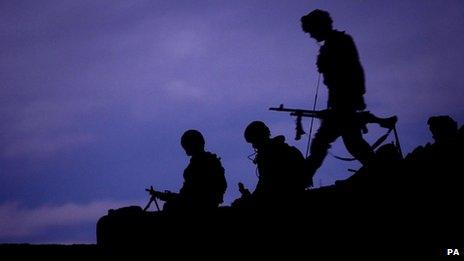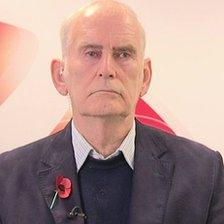Has Afghan murder case damaged reputation of Royal Marines?
- Published

The Royal Marines are the Royal Navy's amphibious infantry
The Royal Marines has a reputation as one of the world's elite fighting forces, but will the Afghanistan murder case damage its reputation?
"A truly shocking and appalling aberration" - those were the words of Brigadier Bill Dunham, deputy commandant general of the Royal Marines, after one of its soldiers was convicted on Friday of murdering an injured Afghan insurgent in 2011.
He said the incident - the details of which were laid bare during a two-week court martial - was not typical of the ethos, values and standards of the marines.
The commandos, who are part of the Royal Navy, are famous the world over for the gruelling training they face and their bravery on the battlefield.
'Worst enemy'
They "deservedly have a worldwide reputation as one of the elite fighting forces", Brig Dunham said following the verdict.

Maj Heyman said the case could be used as propaganda against the UK military
So how will the case affect how they are seen?
Military commentator Major Charles Heyman described the case - the first time the British forces have faced a murder charge in relation to the conflict in Afghanistan - as a "sad day for the British armed forces and a sad day for the Royal Marines".
He said it would cause lasting damage to the reputation of the British military, not just the Royal Marines.
But worse, he said, it could be used by Britain's enemies abroad.
"The terrible thing about this - other than the fact it was a crime - is that the enemy will make a lot out of this," he said.
"The enemy will use this for propaganda purposes. An act like this actually gives them a chance to say the British are the worse sort of enemy in the world, therefore we are justified in fighting them."
During the court martial, the judge rejected an application by the media to release video of the murder to the public, citing propaganda concerns.
Arguing in court that the video clips should not be released, senior Home Office counter-terrorism expert Paul Mott said of the footage: "I've seen nothing that surpasses it in terms of radicalisation potential. It's exceptionally worrying, There's nothing I have seen that matches its emotional power. It is a gift in propaganda terms.
"I am confident that if made publicly available, this footage would not only be used as propaganda material by terrorist organisations in order to radicalise others, but would also be exploited by terrorist organisations to incite individuals to carry out terrorist acts."
The Ministry of Defence had also opposed the release of the footage but Judge Advocate General Jeff Blackett later ruled that audio and stills taken from the video could be released.
The names of the convicted marine - and two others who were acquitted - remain secret to protect them from possible reprisals.
'Front up'
Despite such concerns, military experts said it was important the details of such cases were made public.
"You have got to have institutional integrity, and the best way of doing that is to front up to it," said Peter Quentin, a research fellow in land warfare at defence think tank, the Royal United Services Institute.
"We are out there fighting and dying for a set of principles, values and standards. Unless we are able to adhere to our own, it undermines the whole purpose of that sacrifice."
Brigadier Bill Dunham: "It was a truly shocking and appalling aberration. It should not have happened, and it should never happen again"
Maj Heyman said it was a "big mark" in favour of the reputation of the British armed forces that the case had been dealt with openly.
"Certainly nobody is going to be saying at the end of all this that the MoD tried to cover it up. They didn't, they brought it out into the open, they are punishing the person concerned and we hope we can move on," he said.
Mr Quentin added that he did not think the case would have an impact on the ground.
"Afghans living in Helmand will see the difference between our own focus and that of the insurgents, the vast majority of interactions will be positive," he said.
Another military commentator, Colonel Mike Dewar, stressed the crime was "not the normal behaviour of British soldiers".
"I think our army, mostly, is exemplary in the way that it behaves in extreme circumstances - and we do need to remember they are extreme circumstances and men are brutalised by war," he said.
Brig Dunham, who served for 34 years, said he remained proud of the marines' reputation.
"There is no clearer demonstration of the Royal Marines' ethos than the success and sacrifices made in Afghanistan under the most demanding physical and mental conditions," he said.
- Published8 November 2013
- Published8 November 2013
- Published8 November 2013